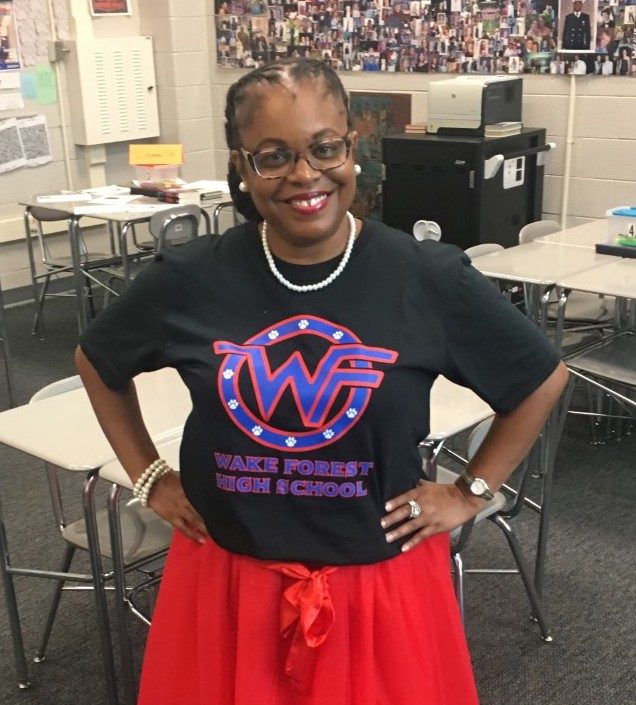Creating Change Agents Through Holocaust Education
Bettina Pope, a teacher in Wake Forest, NC and TOLI alumnae, sees the impact of her teaching the Holocaust has in today’s anti-racism movement.
“I believe in creating change agents,” says Bettina Pope, a teacher in Wake Forest, NC., about her students. And has long felt that her work as a Holocuast educator would lead to change in the world outside the classroom walls.
Participating in TOLI’s professional development seminar in Jackson, Mississippi had a large impact on how she goes about her teaching. And it translates today into the widespread movement for racial justice.
“The first thing that comes to mind is a quote by Elie Wiesel: ‘The opposite of love is not hate; the opposite of love is indifference.’” Bettina says when asked about the current Black Lives Matter movement. “In Holocaust education, we often talk about the role of the bystander. What I am seeing with the BLM movement is that more and more people are refusing to be bystanders. History, specifically the Holocaust, has taught us what happens when good people stand by and do nothing. This generation is the first to have had the benefit of a more comprehensive Holocaust education and I believe that they are putting what they have learned into action. They refuse to be bystanders!”
Bettina’s dedication to social justice has had an impact on her students both within Wake Forest High School, where she has taught for over twenty years, and after graduating, one of her former students formed a Black Student Union group at Penn State during her freshman year, and a current student is seeking Bettina’s guidance to form a Black Student Union organization at the school. She also recently attended a March for Justice with a group of current and former students in support of the Black Lives Matter movement.
In 2019, when Bettina attended the TOLI satellite seminar in Mississippi, she did not anticipate the impact it would have on her as an educator.
“My TOLI experience was life-changing! It has changed so much about what I teach, how I teach, and how I view my role as an educator.”
Bettina teaches English/World Literature and Honors African American Literature to students ranging from grade 10-12 at Wake Forest High School. Her passion for teaching was awakened at an early age, when she would spend hours in the home library of her great aunt and uncles who were teachers.
“It was there, along with sitting beside my mother on a nightly basis as she read, that my love of reading began. My aunt and uncle were so well respected in our community. I knew that was what I wanted for myself.”
Her interest in Holocaust and genocide education began when she started teaching in Wake County in 1998. Elie Wiesel’s Night was required reading in her English course, and through this book she learned that one of the groups persecuted by the Nazis were Afro-Germans. This discovery answered questions Bettina had had about her own family history.
“My great-grandmother… often talked about her father, a German immigrant. When I read about the Afro-Germans, I had to know more, for it was possible that I was learning about my own history.”
She was first introduced to TOLI while attending the annual “Gathering of Holocaust Educators” at the North Carolina Center for the Advancement of Teaching (NCCAT). One of the presenters, Karen Klaich, had participated in the TOLI program in New York and, after hearing her speak about her experience, Bettina knew she had to attend a seminar.
“When I read the description for ‘Reclaiming Our Humanity,’ I knew I must be a part of the program.”
In the year since she attended, Bettina has incorporated many of the resources her cohort was given into her classroom. She uses these techniques to develop a sense of empathy in her students, in particular before they begin their Holocaust unit.
“I’ve also increased the amount of writing that takes place in my classroom, using several of the prompts and writing techniques that I learned in the seminar.”
Thanks to the hard work of teachers like Bettina, there have been some steps forward for Holocaust education at the state level in North Carolina. “Our state is actually moving in a positive direction… as there is a bill in the General Assembly that will mandate Holocaust education throughout the state,” she says of the recent progress.
Although Bettina has been having conversations about racial inequality for years in her African American Literature course, and has inspired students in and out of the classroom to become change agents, her social justice work is far from over. She plans to continue teaching the lessons of the Holocaust while encouraging her students to apply them to the movement for racial equality.

